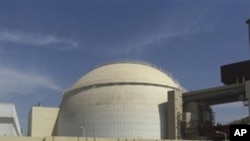Senior diplomats of the five permanent U.N. Security Council member countries and Germany conferred by telephone Thursday on efforts to renew a nuclear dialogue with Iran later this month. Iran has been sending mixed signals about whether it will attend such a meeting.
A senior official here said Undersecretary of State for Political Affairs William Burns was the U.S. participant in the conference call, in which big-power diplomats assessed chances for resuming the nuclear talks.
European Union chief diplomat Catherine Ashton, acting on behalf of the so-called P-Five-Plus-One grouping, has proposed a three-day meeting with Iranian officials in Vienna starting November 15.
Iranian President Mahmoud Ahmadinejad said in New York in late September that Iran is ready in principle for new talks and his government reaffirmed that in a latter to Ashton late last month.
However the senior U.S. official said after the telephone conference that Iran has not provided its thoughts on either a date or venue for a meeting.
The major powers a year ago proposed that Iran, as a nuclear confidence-building measure, export much of its stockpile of low-enriched uranium in return for fuel rods for a Tehran medical research reactor.
Iran has sent mixed signals on the proposal as well, initially embracing it, then backing away, and then endorsing a variant of the idea advanced by Turkey and Brazil earlier this year.
U.S. officials see a research reactor deal as a prelude to broader negotiations over Iran's nuclear program. But they say the terms of the big power offer made last November would have to be tightened to reflect Iran's subsequent enrichment gains.
Iran rejects charges its enrichment program is weapons related and says it will make no concessions on what it says are its nuclear rights.
The senior official who spoke here meanwhile said a U.S. decision Wednesday to put a radical Iranian opposition group on the State Department's list of foreign terrorist organizations was not related to efforts to get Iran back to nuclear talks.
Secretary of State Hillary Clinton announced the action against the Sunni Muslim group Jundallah, which is blamed for a series of lethal attacks including bombings of Iranian Shiite Mosques.
State Department Spokesman P.J. Crowley told reporters the action reflects the U.S. determination to fight terrorism whatever the source, while also again denying Iranian charges of past CIA support for Jundallah.
"That accusation is false," said P.J. Crowley. "The United States does not support terrorism, did not have any relationship with Jundallah. It has provided Jundallah with no support. We designated Jundallah for a simple reason: it met the criteria under U.S. law to be designated as a foreign terrorist organization. It has engaged in terrorism. It does represent a threat to the United States and to our interests in an important region of the world."
An Iranian foreign ministry spokesman Thursday welcomed the U.S. decision as a step in the right direction.
But he reiterated charges that the group - which claims to fight for the rights of Sunni Muslim Baluchis in southeastern Iran - has gotten material U.S. support.
Big-Power Diplomats Confer on Iran Nuclear Talks












